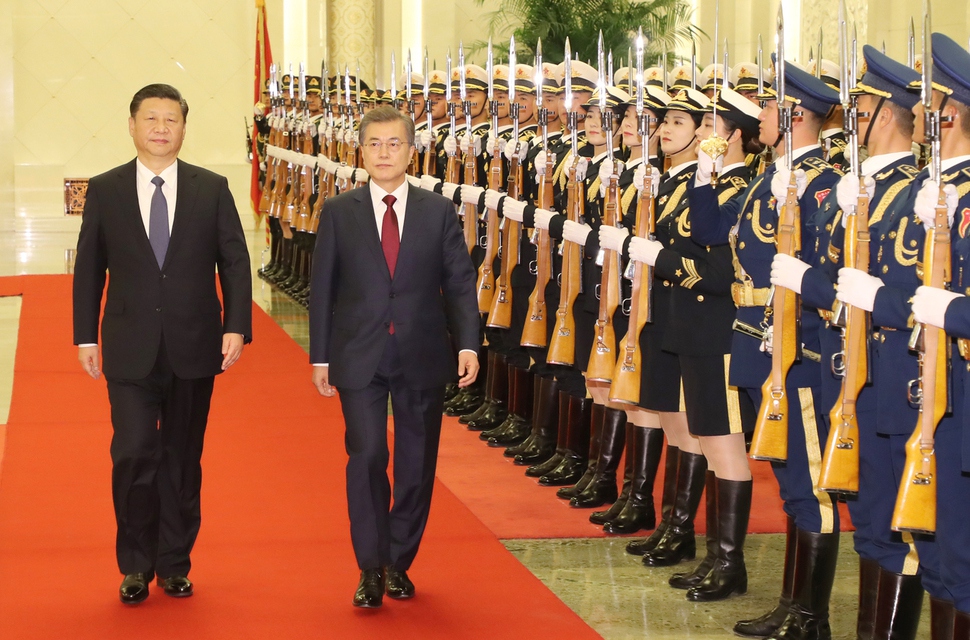 |
|
Chinese President Xi Jinping walks with South Korean President Moon Jae-in past an honor guard at the Great Hall of the People on Dec. 14 prior to their summit. (Yonhap News)
|
Presidents Moon and Xi forcefully rejected any suggestion of war on the Korean Peninsula
The four principles for peace and stability on the Korean Peninsula that South Korean President Moon Jae-in and Chinese President Xi Jinping agreed to during their summit on Dec. 14 convey a strong message that the two countries will actively cooperate to stabilize the Korean Peninsula. The current standoff between North Korea and the US over the North’s development of nuclear weapons and missiles has triggered talk of a crisis, and even war. The two leaders declared that “war on the Korean Peninsula will never be tolerated,” which goes far beyond the standard refrain about a peaceful solution to the North Korean nuclear weapon and missile issue. This derives from the sense that the Korean Peninsula is currently facing a grave crisis. The two countries’ agreement to set up a “hotline between the leaders” can also be said to communicate the desire to find a solution for urgent matters through real-time dialogue between the two sides. “There have been several phone calls between the leaders after North Korea’s repeated provocations, but these have not been easy to arrange,” said a senior Blue House official, implying that the hotline will be a critical means of communication between the two leaders. The two leaders’ declaration that they “hold firmly to the principle of the denuclearization of the Korean Peninsula” can also be seen as conveying a strong message given recent developments on the Korean Peninsula. North Korean leader Kim Jong-un declared the “completion of the state nuclear force” immediately after the test launch of the Hwasong-15 intercontinental ballistic missile, but the leaders of South Korea and China have publicly declared that they will not recognize North Korea as a nuclear weapon state. Along with this, the third principle that “all issues, including North Korea’s denuclearization, are to be resolved peacefully through dialogue and negotiations” is a principle that the two countries have consistently avowed in regard to the North Korean nuclear weapon and missile issue, but this principle takes on new significance in a situation where the Trump administration is mentioning the military option. The most striking of the four principles to which the two leaders agreed was the fourth one, namely that “improving inter-Korean relations is ultimately helpful for resolving the issue of the Korean Peninsula.” This may not sound so unusual, since it is something the two sides have long emphasized. But it is necessary to take note of a recommendation that Xi was quoted as giving to Moon by a news program covering the results of the summit that ran on state-run China Central Television (CCTV) on the evening of Dec. 14: “China will continue to support North and South Korea improving relations through dialogue and contact and pursuing reconciliation and cooperation, and this will help bring about a smooth resolution to the issue of the Korean Peninsula.” What is notable here is that Xi was emphasizing that dialogue between North and South Korea and the strengthening of cooperation and exchange are essential for resolving the North Korean nuclear weapon and missile issue. The solution to conflict between North Korea and the US over this issue previously proposed by Xi and Russian President Vladimir Putin is “simultaneous progress” on talks toward North Korea’s denuclearization and a peace treaty for the Korean Peninsula, coupled with a “double freeze” of North Korea’s nuclear weapon and missile provocations and South Korea and the US’s joint military exercises. But in the summit with Moon, Xi suggested that inter-Korean dialogue is another way to tackle this problem. The fact that Xi emphasized that he would “continue to support North and South Korea’s efforts toward reconciliation and cooperation” can be also taken to mean that Xi is willing to play an assertive role in facilitating inter-Korean dialogue. Moon and Xi have effectively declared their willingness to treat the four principles agreed upon in this meeting as a compass and a launchpad for proactive cooperation aimed at restoring stability and peace to the Korean Peninsula, which has been in a state of crisis amidst the showdown between North Korean leader Kim Jong-un and US President Donald Trump. During the expanded summit on Dec. 14, South Korea was represented by key figures from the Blue House and the government, including Deputy Prime Minister for Economic Affairs Kim Dong-yeon and Blue House National Security Chief Chung Eui-yong, while China was represented by officials including State Councilor Yang Jiechi and Foreign Minister Wang Yi. By Kim Bo-hyeop, staff reporter Please direct questions or comments to [english@hani.co.kr]






